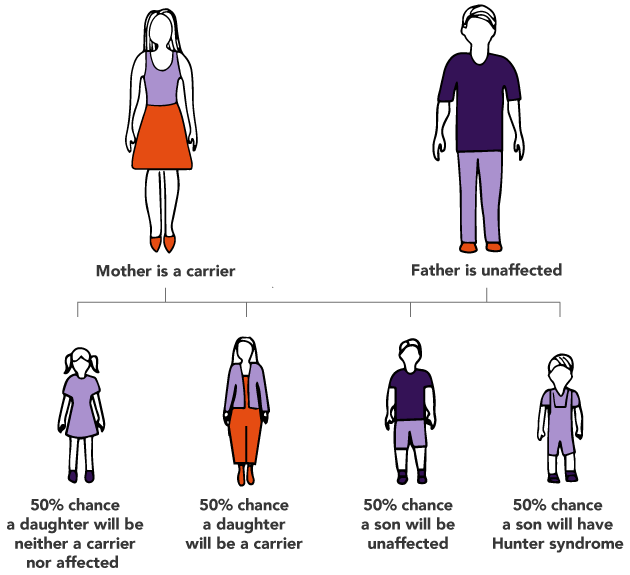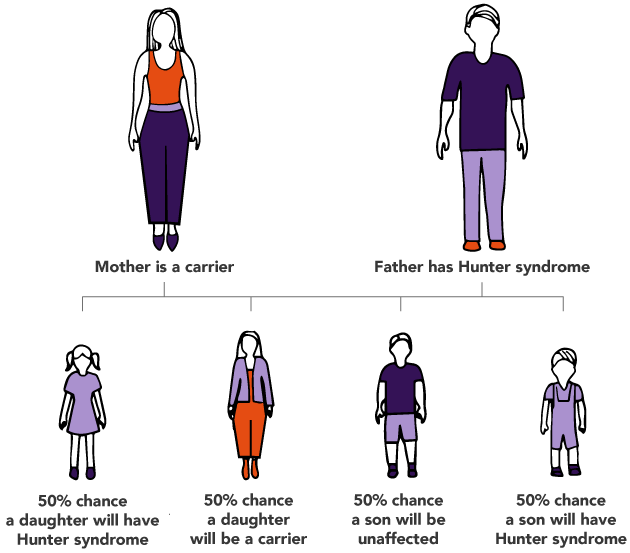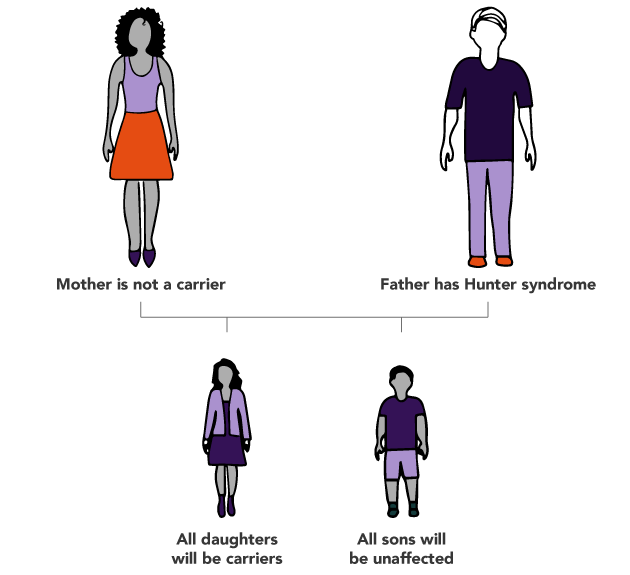This site is intended for u.s. audiences
This site is intended for u.s. audiences
Hunter syndrome (MPS II) affects approximately 1 in 162,000 live male births. It is an inherited X-linked recessive disorder, which means that it is passed down from one generation to the next in a specific way that causes it to primarily affect male offspring.
Nearly every cell in the human body has 46 chromosomes, with 23 inherited from each parent. The 23rd pair of chromosomes each person has determines their biological sex; females have two X chromosomes, one inherited from each parent, whereas males have one X chromosome inherited from their mother and one Y chromosome inherited from their father.
The iduronate-2-sulfatase (I2S) gene, which is responsible for the I2S enzyme that is deficient or missing in Hunter syndrome, is located on the X chromosome. This means that the most common way for Hunter syndrome to be passed down is from a female carrier to their male offspring. Females can carry one altered copy of the I2S gene and are usually not affected. Although extremely rare, there have been some cases of Hunter syndrome reported in females.
If a male has an altered copy of the I2S gene, he will develop Hunter syndrome. A male can obtain an altered copy of this gene in one of two ways:

CARRIER MOTHER

His mother is a carrier, which means she has one altered and one normal I2S gene but is not affected by Hunter syndrome, and she passes along the altered gene to him.

During egg and sperm formation, a mutation can develop in the I2S gene on the X chromosome. In these cases, the mother is not a carrier and the risk of a spontaneous mutation occurring again in a future sibling is very low but not zero.

The two scenarios shown above depict how Hunter syndrome can come to affect males specifically; however, it is also valuable to understand the overall processes by which altered genes can be inherited by both male and female offspring, causing a range of outcomes both visible and invisible.
The two scenarios shown above depict how Hunter syndrome can come to affect males specifically; however, it is also valuable to understand the overall processes by which altered genes can be inherited by both male and female offspring, causing a range of outcomes both visible and invisible.
There are three such scenarios in which Hunter syndrome may be passed down to offspring, who will either become carriers of the gene or be affected by Hunter syndrome themselves:


CARRIER MOTHER If the mother is a carrier and the father is unaffected, there is a 50% chance that the mother will pass on the altered gene to her daughters, who will also be carriers; similarly, there is a 50% chance that she will pass on the altered gene to her sons, who will have Hunter syndrome.


CARRIER
MOTHER,
affected father
If the mother is a carrier and the father has Hunter syndrome, he
will
pass
his altered gene to his daughters but not to his sons because the
altered
I2S gene is located on the X chromosome. There is then a 50% chance
of
the
mother passing her altered gene to her children. Therefore, there is
a
50%
chance that their children will have Hunter syndrome, no matter
their
sex.
Alternatively, there is a 50% chance that their daughters will be carriers and their sons won't have Hunter syndrome.


AFFECTED FATHER If the mother is not a carrier and unaffected, and the father has Hunter syndrome, the father will pass on the altered gene to all his daughters, who will all become carriers, but none of his sons, who will all be unaffected.
If you have a family history of Hunter syndrome or are concerned, speak to a healthcare professional.